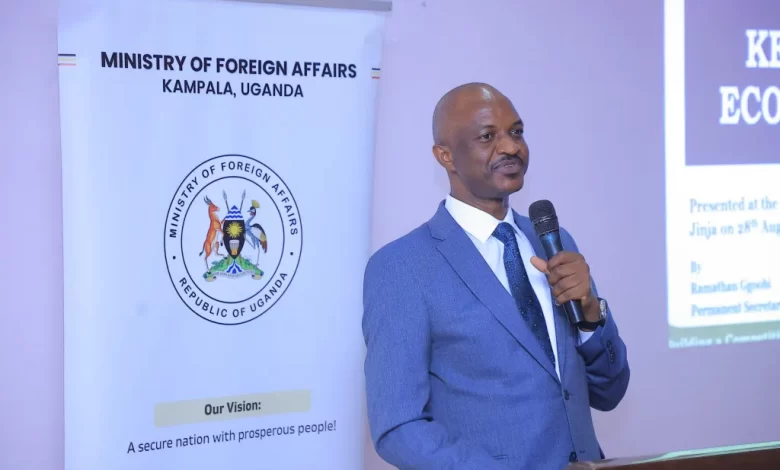Finance PS Ggoobi tips to ambassadors on boosting Uganda’s economic growth
Mr. Ggoobi presented an overview of Uganda's economic recovery, noting that the GDP growth rate had rebounded to 6% in FY 2023/24 from 3% in FY 2019/20, driven by sound macroeconomic management, favorable weather, and improving global conditions.

The Permanent Secretary of the Ministry of Finance, Planning, and Economic Development, Mr. Ramathan Ggoobi, has called on ambassadors and heads of missions to play a pivotal role in advancing Uganda’s economic growth by employing innovative branding and marketing strategies.
Addressing a week-long retreat for ambassadors and heads of missions at the Civil Service College in Jinja, themed “Strengthening Governance and Performance of the Foreign Service for National Development,” Mr. Ggoobi underscored the need to attract tourists and investors to achieve Uganda’s ambitious 10-fold growth strategy.
“Tourism is a low-hanging fruit that should be prioritized by our ambassadors abroad,” Mr. Ggoobi stated, highlighting that the country aims to double its economy every five years, despite facing various crises.
Mr. Ggoobi presented an overview of Uganda’s economic recovery, noting that the GDP growth rate had rebounded to 6% in FY 2023/24 from 3% in FY 2019/20, driven by sound macroeconomic management, favorable weather, and improving global conditions.
He emphasized that growth had been widespread across sectors: Services expanded by 6.6%, Industry by 5.8%, and Agriculture by 5.1% in FY 2023/24. The GDP growth rate is projected to reach 6.4% this year and at least 7% over the medium term, with expectations to exceed 10% in the initial years under the 10-fold growth strategy.
He outlined Uganda’s action plan for achieving 10-fold growth, emphasizing key sectors like agro-industrial development, tourism, minerals, oil and gas, and advancements in science, technology, ICT, and innovation. Mr. Ggoobi discussed various financing options, including tax revenues, total debt, market capitalization, and private sector credit.
Mr. Ggoobi urged ambassadors and heads of missions to align their efforts with the country’s economic objectives, stressing the importance of policy alignment, disciplined execution, civic and trade order, natural capital preservation, infrastructure development, and enhancing human capital skills. He also highlighted potential risks, such as corruption, inequality, climate change, global economic shocks, and resource conflicts, and recommended mitigations like inclusive policies, diversification, and deeper regional integration.
The Foreign Affairs Permanent Secretary, Vincent Bagiire, acknowledged the significant impact of the Ministry’s efforts, despite their often low visibility. He cited achievements such as the Jinja Bridge, facilitated by negotiations through Uganda’s Embassy in Tokyo, and the construction of an airport in Karamoja and a polytechnic institute, both initiated by Uganda’s Embassy in Abu Dhabi.
The Ambassadors’ Conference was inaugurated by Gen. Odongo Jeje Abubakhar, Minister of Foreign Affairs, who called on Ugandan ambassadors to align their work with the country’s National Development framework, including Vision 2040 and the Third National Development Plan. He emphasized that Uganda’s foreign policy should be a driver of economic growth and regional integration, advocating for economic and commercial diplomacy to promote value addition, industrialization, and trade.
The conference aims to enhance performance and innovation among missions, foster peer-to-peer knowledge sharing, and promote regional and international peace and security.







